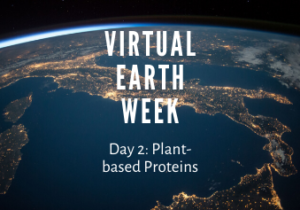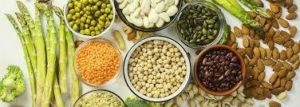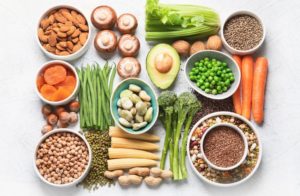Virtual Earth Week, Part 2: Plant-Based Proteins
For the 50th anniversary of Earth Day, we have put together a 5-part blog series, releasing a new post each day of Earth Week. DNDA is also launching a new video series about environmentally friendly cooking on our YouTube channel today, Tuesday April 21, and we will be drawing a winner from our Earth Day giveaway on Friday, April 24. Stay safe, stay healthy, and join us in celebrating Earth Week from home!
Animal agriculture is one of the greatest contributors to climate change. It is resource-intensive and produces a large fraction of the methane in the atmosphere. Focusing on a more plant-based diet is very beneficial, and easier than you might think! Yesterday, we talked about the benefits of “Meatless Monday” and how reducing or eliminating meat can be a great step towards reducing your overall carbon footprint. Today, we will discuss some protein-packed alternatives.
Plant Based Proteins
These are just a few easy plant-based proteins, which are all great alternatives to meat. All of them can typically be found in the bulk section at the grocery store, helping further reduce plastic waste created.
- Lentils: About 9 grams of protein per half-cup
Lentils can be made into stews, curries, served with mixed vegetables, or eaten on their own. Lentils are used in many different cultures’ cuisine, and can be cooked in many different styles. Frequently featured in Indian, Mediterranean, Moroccan, French, and Italian cuisine (to name a few), lentils have been used for centuries as a healthy source of plant-based protein. Lentils come in many different colors and variations. All are fairly similar, but can provide variety in taste and texture. For many vegan recipes featuring lentils around the world, click here. There’s even a recipe for healthy vegan lentil nachos.
- Chickpeas: About 7 grams per half-cup
Chickpeas, or garbanzo beans, are one of the most versatile plant proteins: they can be added to smoothies, salads, soups, curries, stir-fry, or mashed to make hummus or falafel. Chickpeas can also be a great substitute in a sandwich or salad for tuna, which has been shown to have high levels of mercury and often has unsustainable fishing practices. For more recipes with garbanzo beans, click here.
- Peanuts: About 20 grams per half-cup
Peanuts are a tried-and-true source of vegan protein. Most bulk good sections have peanuts, and many also offer fresh-crushed peanut butter. Aside from the classic PB&J, there are tons of sweet or savory recipes that call for peanuts or peanut butter. Mixed and melted down, peanut butter can make a Thai peanut sauce that adds plant-based protein to any vegetable or noodle dish. It can also add a great protein-filled crunch to smoothies!
- Quinoa: About 4 grams per half-cup
Quinoa is a light, fluffy grain that makes a great addition to salads, harvest bowls, or served with mixed vegetables. It is a great source of fiber, and antioxidants, and its neutral flavor makes it quite versatile. It can even be formed into patties for a nutritious garden burger. To see more vegan quinoa recipes, click here.
- Cashews: About 12 grams per half-cup.
Cashews are great for light snacking, sauces, salad toppers, or cooked with mixed vegetables. They are a vegan favorite because they can be used to make cashew queso, great for nachos, tacos, mac n’ cheese, enchiladas, etc. They are used to make vegan cashew milks, yogurts, cheeses, and more.
- Black Beans: About 7 grams per half-cup
This classic protein can be a great base for soups, burrito bowls and tacos. It makes a great substitute for meat in vegan chili. For dozens of easy vegan black bean recipes, click here.
These are just a few, but there are many more nuts, beans, seeds, and vegetables that are loaded with heart-healthy protein. Focusing on plant-based proteins can drastically reduce the amount of water and land use, packaging waste, electricity, and greenhouse gas production.
Bulk Section
Many grocery stores have a bulk section with dozens of different nuts, seeds, beans, and rice, where customers can measure out the amount they want, and pay by weight. Shopping bulk is a great way to reduce the amount of plastic that is wasted when buying groceries. Some stores even provide reusable cloth bags or allow customers to bring their own. This way someone can get the exact amount they need while saving money and helping the environment. Click here for an excellent guide to bulk grocery shopping in Washington State. All of the foods below can be easily found in bulk grocery stores, helping to reduce waste while incorporating vegan proteins!
Go Vegan for Earth Day
We challenge you to go 100 percent vegan for Earth Day tomorrow! For inspiration on what delicious and fun meals you can whip up, check out our new video series, In the Kitchen with Christina! These videos showcase how to make three tasty vegan breakfast, dinner and dessert recipes. Incorporating more plant-based meals into your diet is greatly beneficial to the natural environment. Whether you choose to partake in Meatless Mondays or want to transition to an entirely vegan diet, this series is a great place to start. Additionally, if you’re interested in finding fresh, local and organic goods, check out this comprehensive list of pick-up and delivery services in Seattle.
Stay tuned for the rest of this week’s Virtual Earth Day blog post series! We’ll be posting a mini blog post each day during Earth Week to inspire you to take virtual action for your planet. We’re also hosting an Earth Day Giveaway for a chance to win an Earth Day gift box with reusable kitchen and home products. To enter, make an environmental pledge by Friday, April 24 5:00 PM PST: the winner will be announced the next day!



